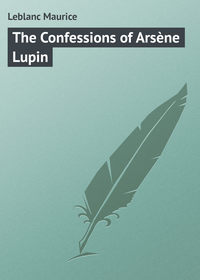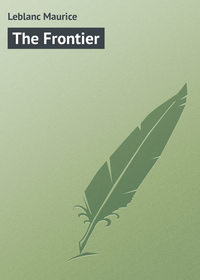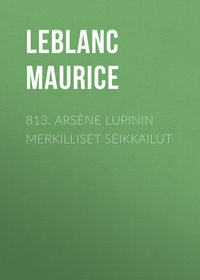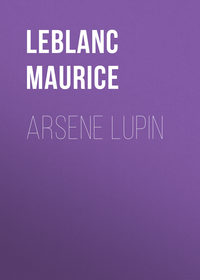 полная версия
полная версияThe Hollow Needle; Further adventures of Arsene Lupin
An immense clamor of astonishment, admiration and curiosity arose among the public. Already, the Rouen journalist, in a very able article, had described the first examination of the sixth-form pupil, laying stress upon his personal charm, his simplicity of manner and his quiet assurance. The indiscretions of Ganimard and M. Filleul, indiscretions to which they yielded in spite of themselves, under an impulse that proved stronger than their professional pride, suddenly enlightened the public as to the part played by Isidore Beautrelet in recent events. He alone had done everything. To him alone the merit of the victory was due.
The excitement was intense. Isidore Beautrelet awoke to find himself a hero; and the crowd, suddenly infatuated, insisted upon the fullest information regarding its new favorite. The reporters were there to supply it. They rushed to the assault of the Lycee Janson-de-Sailly, waited for the day-boarders to come out after schoolhours and picked up all that related, however remotely, to Beautrelet. It was in this way that they learned the reputation which he enjoyed among his schoolfellows, who called him the rival of Holmlock Shears. Thanks to his powers of logical reasoning, with no further data than those which he was able to gather from the papers, he had, time after time, proclaimed the solution of very complicated cases long before they were cleared up by the police.
It had become a game at the Lycee Janson to put difficult questions and intricate problems to Beautrelet; and it was astonishing to see with what unhesitating and analytical power and by means of what ingenious deductions he made his way through the thickest darkness. Ten days before the arrest of Jorisse, the grocer, he showed what could be done with the famous umbrella. In the same way, he declared from the beginning, in the matter of the Saint-Cloud mystery, that the concierge was the only possible murderer.
But most curious of all was the pamphlet which was found circulating among the boys at the school, a typewritten pamphlet signed by Beautrelet and manifolded to the number of ten copies. It was entitled, ARSENE LUPIN AND HIS METHOD, SHOWING IN HOW FAR THE LATTER IS BASED UPON TRADITION AND IN HOW FAR ORIGINAL. FOLLOWED BY A COMPARISON BETWEEN ENGLISH HUMOR AND FRENCH IRONY.
It contained a profound study of each of the exploits of Arsene Lupin, throwing the illustrious burglar's operations into extraordinary relief, showing the very mechanism of his way of setting to work, his special tactics, his letters to the press, his threats, the announcement of his thefts, in short, the whole bag of tricks which he employed to bamboozle his selected victim and throw him into such a state of mind that the victim almost offered himself to the plot contrived against him and that everything took place, as it were, with his own consent.
And the work was so just, regarded as a piece of criticism, so penetrating, so lively and marked by a wit so clever and, at the same time, so cruel that the lawyers at once passed over to his side, that the sympathy of the crowd was summarily transferred from Lupin to Beautrelet and that, in the struggle engaged upon between the two, the schoolboy's victory was loudly proclaimed in advance.
Be this as it may, both M. Filleul and the Paris public prosecutor seemed jealously to reserve the possibility of this victory for him. On the one hand, they failed to establish Mr. Harlington's identity or to furnish a definite proof of his connection with Lupin's gang. Confederate or not, he preserved an obstinate silence. Nay, more, after examining his handwriting, it was impossible to declare that he was the author of the intercepted letter. A Mr. Harlington, carrying a small portmanteau and a pocket-book stuffed with bank-notes, had taken up his abode at the Grand Hotel: that was all that could be stated with certainty.
On the other hand, at Dieppe, M. Filleul lay down on the positions which Beautrelet had won for him. He did not move a step forward. Around the individual whom Mlle. de Saint-Veran had taken for Beautrelet, on the eve of the crime, the same mystery reigned as heretofore. The same obscurity also surrounded everything connected with the removal of the four Rubens pictures. What had become of them? And what road had been taken by the motor car in which they were carried off during the night?
Evidence of its passing was obtained at Luneray at Yerville, at Yvetot and at Caudebec-en-Caux, where it must have crossed the Seine at daybreak in the steam-ferry. But, when the matter came to be inquired into more thoroughly, it was stated that the motor car was an uncovered one and that it would have been impossible to pack four large pictures into it unobserved by the ferryman.
It was very probably the same car; but then the question cropped up again: what had become of the four Rubenses?
These were so many problems which M. Filleul unanswered. Every day, his subordinates searched the quadrilateral of the ruins. Almost every day, he came to direct the explorations. But between that and discovering the refuge in which Lupin lay dying—if it were true that Beautrelet's opinion was correct—there was a gulf fixed which the worthy magistrate did not seem likely to cross.
And so it was natural that they should turn once more to Isidore Beautrelet, as he alone had succeeded in dispelling shadows which, in his absence, gathered thicker and more impenetrable than ever. Why did he not go on with the case? Seeing how far he had carried it, he required but an effort to succeed.
The question was put to him by a member of the staff of the Grand Journal, who had obtained admission to the Lycee Janson by assuming the name of Bernod, the friend of Beautrelet's father. And Isidore very sensibly replied:
"My dear sir, there are other things besides Lupin in this world, other things besides stories about burglars and detectives. There is, for instance, the thing which is known as taking one's degree. Now I am going up for my examination in July. This is May. And I don't want to be plucked. What would my worthy parent say?"
"But what would he say if you delivered Arsene Lupin into the hands of the police?"
"Tut! There's a time for everything. In the next holidays—"
"Whitsuntide?"
"Yes—I shall go down on Saturday the sixth of June by the first train."
"And, on the evening of that Saturday, Lupin will be taken."
"Will you give me until the Sunday?" asked Beautrelet, laughing.
"Why delay?" replied the journalist, quite seriously.
This inexplicable confidence, born of yesterday and already so strong, was felt with regard to the young man by one and all, even though, in reality, events had justified it only up to a certain point. No matter, people believed in him! Nothing seemed difficult to him. They expected from him what they were entitled to expect at most from some phenomenon of penetration and intuition, of experience and skill. That day of the sixth of June was made to sprawl over all the papers. On the sixth of June, Isidore Beautrelet would take the fast train to Dieppe: and Lupin would be arrested on the same evening.
"Unless he escapes between this and then," objected the last remaining partisans of the adventurer.
"Impossible! Every outlet is watched."
"Unless he has succumbed to his wounds, then," said the partisans, who would have preferred their hero's death to his capture.
And the retort was immediate:
"Nonsense! If Lupin were dead, his confederates would know it by now, and Lupin would be revenged. Beautrelet said so!"
And the sixth of June came. Half a dozen journalists were looking out for Isidore at the Gare Saint-Lazare. Two of them wanted to accompany him on his journey. He begged them to refrain.
He started alone, therefore, in a compartment to himself. He was tired, thanks to a series of nights devoted to study, and soon fell asleep. He slept heavily. In his dreams, he had an impression that the train stopped at different stations and that people got in and out. When he awoke, within sight of Rouen, he was still alone. But, on the back of the opposite seat, was a large sheet of paper, fastened with a pin to the gray cloth. It bore these words:
"Every man should mind his own business. Do you mind yours. If not, you must take the consequences."
"Capital!" he exclaimed, rubbing his hands with delight. "Things are going badly in the adversary's camp. That threat is as stupid and vulgar as the sham flyman's. What a style! One can see that it wasn't composed by Lupin."
The train threaded the tunnel that precedes the old Norman city. On reaching the station, Isidore took a few turns on the platform to stretch his legs. He was about to re-enter his compartment, when a cry escaped him. As he passed the bookstall, he had read, in an absent-minded way, the following lines on the front page of a special edition of the Journal de Rouen; and their alarming sense suddenly burst upon him:
STOP-PRESS NEWS
We hear by telephone from Dieppe that the Chateau d'Ambrumesy was broken into last night by criminals, who bound and gagged Mlle. de Gesvres and carried off Mlle. de Saint-Veran. Traces of blood have been seen at a distance of five hundred yards from the house and a scarf has been found close by, which is also stained with blood. There is every reason to fear that the poor young girl has been murdered.
Isidore Beautrelet completed his journey to Dieppe without moving a limb. Bent in two, with his elbows on his knees and his hands plastered against his face, he sat thinking.
At Dieppe, he took a fly. At the door of Ambrumesy, he met the examining magistrate, who confirmed the horrible news.
"You know nothing more?" asked Beautrelet.
"Nothing. I have only just arrived."
At that moment, the sergeant of gendarmes came up to M. Filleul and handed him a crumpled, torn and discolored piece of paper, which he had picked up not far from the place where the scarf was found. M. Filleul looked at it and gave it to Beautrelet, saying:
"I don't suppose this will help us much in our investigations."
Isidore turned the paper over and over. It was covered with figures, dots and signs and presented the exact appearance reproduced below:
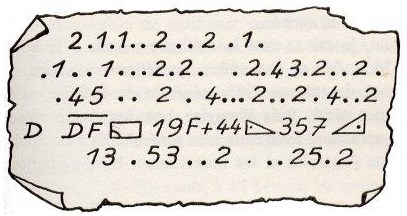
CHAPTER THREE
THE CORPSE
At six o'clock in the evening, having finished all he had to do, M. Filluel, accompanied by M. Bredoux, his clerk, stood waiting for the carriage which was to take him back to Dieppe. He seemed restless, nervous. Twice over, he asked:
"You haven't seen anything of young Beautrelet, I suppose?"
"No, Monsieur le Juge d'Instruction, I can't say I have."
"Where on earth can he be? I haven't set eyes on him all day!"
Suddenly, he had an idea, handed his portfolio to Bredoux, ran round the chateau and made for the ruins. Isidore Beautrelet was lying near the cloisters, flat on his face, with one arm folded under his head, on the ground carpeted with pine-needles. He seemed drowsing.
"Hullo, young man, what are you doing here? Are you asleep?"
"I'm not asleep. I've been thinking."
"Ever since this morning?"
"Ever since this morning."
"It's not a question of thinking! One must see into things first, study facts, look for clues, establish connecting links. The time for thinking comes after, when one pieces all that together and discovers the truth."
"Yes, I know.—That's the usual way, the right one, I dare say.—Mine is different.—I think first, I try, above all, to get the general hang of the case, if I may so express myself. Then I imagine a reasonable and logical hypothesis, which fits in with the general idea. And then, and not before, I examine the facts to see if they agree with my hypothesis."
"That's a funny method and a terribly complicated one!"
"It's a sure method, M. Filleul, which is more than can be said of yours."
"Come, come! Facts are facts."
"With your ordinary sort of adversary, yes. But, given an enemy endowed with a certain amount of cunning, the facts are those which he happens to have selected. Take the famous clues upon which you base your inquiry: why, he was at liberty to arrange them as he liked. And you see where that can lead you, into what mistakes and absurdities, when you are dealing with a man like Arsene Lupin. Holmlock Shears himself fell into the trap."
"Arsene Lupin is dead."
"No matter. His gang remains and the pupils of such a master are masters themselves."
M. Filleul took Isidore by the arm and, leading him away:
"Words, young man, words. Here is something of more importance. Listen to me. Ganimard is otherwise engaged at this moment and will not be here for a few days. On the other hand, the Comte de Gesvres has telegraphed to Holmlock Shears, who has promised his assistance next week. Now don't you think, young man, that it would be a feather in our cap if we were able to say to those two celebrities, on the day of their arrival, 'Awfully sorry, gentlemen, but we couldn't wait. The business is done'?"
It was impossible for M. Filleul to confess helplessness with greater candor. Beautrelet suppressed a smile and, pretending not to see through the worthy magistrate, replied:
"I confess. Monsieur le Juge d'Instruction, that, if I was not present at your inquiry just now, it was because I hoped that you would consent to tell me the results. May I ask what you have learned?"
"Well, last night, at eleven o'clock, the three gendarmes whom Sergeant Quevillon had left on guard at the chateau received a note from the sergeant telling them to hasten with all speed to Ouville, where they are stationed. They at once rode off, and when they arrived at Ouville—"
"They discovered that they had been tricked, that the order was a forgery and that there was nothing for them to do but return to Ambrumesy."
"This they did, accompanied by Sergeant Quevillon. But they were away for an hour and a half and, during this time, the crime was committed."
"In what circumstances?"
"Very simple circumstances, indeed. A ladder was removed from the farm buildings and placed against the second story of the chateau. A pane of glass was cut out and a window opened. Two men, carrying a dark lantern, entered Mlle. de Gesvres's room and gagged her before she could cry out. Then, after binding her with cords, they softly opened the door of the room in which Mlle. de Saint-Veran was sleeping. Mlle. de Gesvres heard a stifled moan, followed by the sound of a person struggling. A moment later, she saw two men carrying her cousin, who was also bound and gagged. They passed in front of her and went out through the window. Then Mlle. de Gesvres, terrified and exhausted, fainted."
"But what about the dogs? I thought M. de Gesvres had bought two almost wild sheep-dogs, which were let loose at night?"
"They were found dead, poisoned."
"By whom? Nobody could get near them."
"It's a mystery. The fact remains that the two men crossed the ruins without let or hindrance and went out by the little door which we have heard so much about. They passed through the copsewood, following the line of the disused quarries. It was not until they were nearly half a mile from the chateau, at the foot of the tree known as the Great Oak, that they stopped—and executed their purpose."
"If they came with the intention of killing Mlle. de Saint-Veran, why didn't they murder her in her room?"
"I don't know. Perhaps the incident that settled their determination only occurred after they had left the house. Perhaps the girl succeeded in releasing herself from her bonds. In my opinion, the scarf which was picked up was used to fasten her wrists. In any case, the blow was struck at the foot of the Great Oak. I have collected indisputable proofs—"
"But the body?"
"The body has not been found, but there is nothing excessively surprising in that. As a matter of fact, the trail which I followed brought me to the church at Varengeville and the old cemetery perched on the top of the cliff. From there it is a sheer precipice, a fall of over three hundred feet to the rocks and the sea below. In a day or two, a stronger tide than usual will cast up the body on the beach."
"Obviously. This is all very simple."
"Yes, it is all very simple and doesn't trouble me in the least. Lupin is dead, his accomplices heard of it and, to revenge themselves, have killed Mlle. de Saint-Veran. These are facts which did not even require checking. But Lupin?"
"What about him?"
"What has become of him? In all probability, his confederates removed his corpse at the same time that they carried away the girl; but what proof have we? None at all. Any more than of his staying in the ruins, or of his death, or of his life. And that is the real mystery, M. Beautrelet. The murder of Mlle. Raymonde solves nothing. On the contrary, it only complicates matters. What has been happening during the past two months at the Chateau d'Ambrumesy? If we don't clear up the riddle, young man, others will give us the go-by."
"On what day are those others coming?"
"Wednesday—Tuesday perhaps—"
Beautrelet seemed to be making an inward calculation and then declared:
"Monsieur le Juge d'Instruction, this is Saturday. I have to be back at school on Monday evening. Well, if you will have the goodness to be here at ten o'clock exactly on Monday morning, I will try to give you the key to the riddle."
"Really, M. Beautrelet—do you think so? Are you sure?"
"I hope so, at any rate."
"And where are you going now?"
"I am going to see if the facts consent to fit in with the general theory which I am beginning to perceive."
"And if they don't fit in?"
"Well, Monsieur le Juge d'Instruction," said Beautrelet, with a laugh, "then it will be their fault and I must look for others which, will prove more tractable. Till Monday, then?"
"Till Monday."
A few minutes later, M. Filleul was driving toward Dieppe, while Isidore mounted a bicycle which he had borrowed from the Comte de Gesvres and rode off along the road to Yerville and Caudebec-en-Caux.
There was one point in particular on which the young man was anxious to form a clear opinion, because this just appeared to him to be the enemy's weakest point. Objects of the size of the four Rubens pictures cannot be juggled away. They were bound to be somewhere. Granting that it was impossible to find them for the moment, might one not discover the road by which they had disappeared?
What Beautrelet surmised was that the four pictures had undoubtedly been carried off in the motor car, but that, before reaching Caudebec, they were transferred to another car, which had crossed the Seine either above Caudebec or below it. Now the first horse-boat down the stream was at Quillebeuf, a greatly frequented ferry and, consequently, dangerous. Up stream, there was the ferry-boat at La Mailleraie, a large, but lonely market-town, lying well off the main road.
By midnight, Isidore had covered the thirty-five or forty miles to La Mailleraie and was knocking at the door of an inn by the waterside. He slept there and, in the morning, questioned the ferrymen.
They consulted the counterfoils in the traffic-book. No motor-car had crossed on Thursday the 23rd of April.
"A horse-drawn vehicle, then?" suggested Beautrelet. "A cart? A van?"
"No, not either."
Isidore continued his inquiries all through the morning. He was on the point of leaving for Quillebeuf, when the waiter of the inn at which he had spent the night said:
"I came back from my thirteen days' training on the morning of which you are speaking and I saw a cart, but it did not go across."
"Really?"
"No, they unloaded it onto a flat boat, a barge of sorts, which was moored to the wharf."
"And where did the cart come from?"
"Oh, I knew it at once. It belonged to Master Vatinel, the carter."
"And where does he live?"
"At Louvetot."
Beautrelet consulted his military map. The hamlet of Louvetot lay where the highroad between Yvetot and Caudebec was crossed by a little winding road that ran through the woods to La Mailleraie.
Not until six o'clock in the evening did Isidore succeed in discovering Master Vatinel, in a pothouse. Master Vatinel was one of those artful old Normans who are always on their guard, who distrust strangers, but who are unable to resist the lure of a gold coin or the influence of a glass or two:
"Well, yes, sir, the men in the motor car that morning had told me to meet them at five o'clock at the crossroads. They gave me four great, big things, as high as that. One of them went with me and we carted the things to the barge."
"You speak of them as if you knew them before."
"I should think I did know them! It was the sixth time they were employing me."
Isidore gave a start:
"The sixth time, you say? And since when?"
"Why every day before that one, to be sure! But it was other things then—great blocks of stone—or else smaller, longish ones, wrapped up in newspapers, which they carried as if they were worth I don't know what. Oh, I mustn't touch those on any account!—But what's the matter? You've turned quite white."
"Nothing—the heat of the room—"
Beautrelet staggered out into the air. The joy, the surprise of the discovery made him feel giddy. He went back very quietly to Varengeville, slept in the village, spent an hour at the mayor's offices with the school-master and returned to the chateau. There he found a letter awaiting him "care of M. le Comte de Gesvres." It consisted of a single line:
"Second warning. Hold your tongue. If not—"
"Come," he muttered. "I shall have to make up my mind and take a few precautions for my personal safety. If not, as they say—"
It was nine o'clock. He strolled about among the ruins and then lay down near the cloisters and closed his eyes.
"Well, young man, are you satisfied with the results of your campaign?"
It was M. Filleul.
"Delighted, Monsieur le Juge d'Instruction."
"By which you mean to say—?"
"By which I mean to say that I am prepared to keep my promise—in spite of this very uninviting letter."
He showed the letter to M. Filleul.
"Pooh! Stuff and nonsense!" cried the magistrate. "I hope you won't let that prevent you—"
"From telling you what I know? No, Monsieur le Juge d'Instruction. I have given my word and I shall keep it. In less than ten minutes, you shall know—a part of the truth."
"A part?"
"Yes, in my opinion, Lupin's hiding-place does not constitute the whole of the problem. Far from it. But we shall see later on."
"M. Beautrelet, nothing that you do could astonish me now. But how were you able to discover—?"
"Oh, in a very natural way! In the letter from old man Harlington to M. Etienne de Vaudreix, or rather to Lupin—"
"The intercepted letter?"
"Yes. There is a phrase which always puzzled me. After saying that the pictures are to be forwarded as arranged, he goes on to say, 'You may add THE REST, if you are able to succeed, which I doubt.'"
"Yes, I remember."
"What was this 'rest'? A work of art, a curiosity? The chateau contains nothing of any value besides the Rubenses and the tapestries. Jewelry? There is very little and what there is of it is not worth much. In that case, what could it be?—On the other hand, was it conceivable that people so prodigiously clever as Lupin should not have succeeded in adding 'the rest,' which they themselves had evidently suggested? A difficult undertaking, very likely; exceptional, surprising, I dare say; but possible and therefore certain, since Lupin wished it."
"And yet he failed: nothing has disappeared."
"He did not fail: something has disappeared."
"Yes, the Rubenses—but—"
"The Rubenses and something besides—something which has been replaced by a similar thing, as in the case of the Rubenses; something much more uncommon, much rarer, much more valuable than the Rubenses."
"Well, what? You're killing me with this procrastination!"
While talking, the two men had crossed the ruins, turned toward the little door and were now walking beside the chapel. Beautrelet stopped:
"Do you really want to know, Monsieur le Juge d'Instruction?"
"Of course, I do."
Beautrelet was carrying a walking-stick, a strong, knotted stick. Suddenly, with a back stroke of this stick, he smashed one of the little statues that adorned the front of the chapel.


